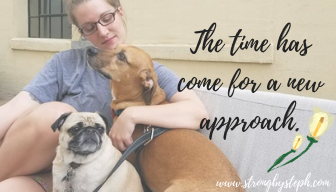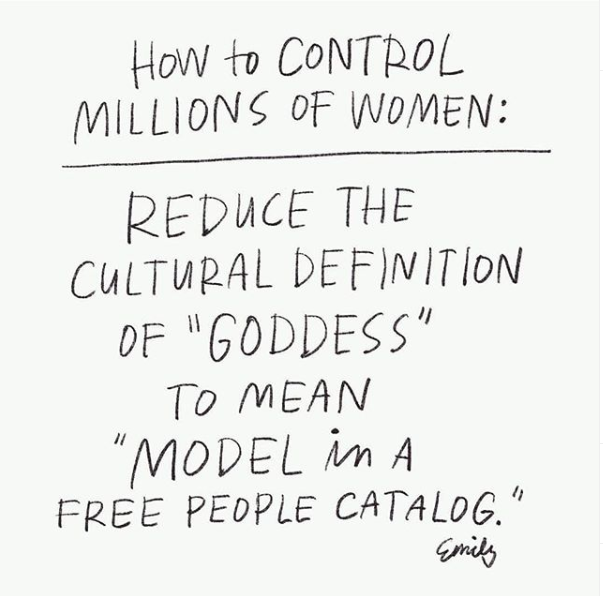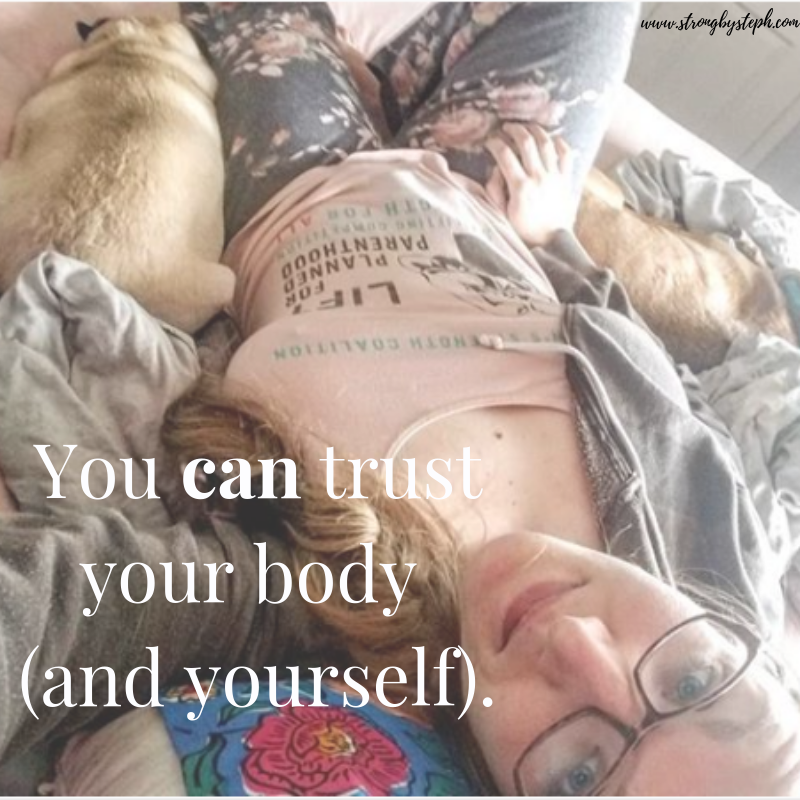When you’re in the soup of diet culture, believing your (allegedly unlovable, misshapen, wrong) body is all that you are, loving it can seem so far away it feels surreal.
Learning to detach our worth from our appearance doesn’t require that we actively love every inch of ourselves. It would be disingenuous and harmful to proclaim that feeling worthy of love, respect, and belonging can only happen once you love every inch of your body. But, maybe, we could get to a place where we all realize, with every waking moment and throughout every single interaction, we are more than our bodies (easy to say we know this, but how often are you on the receiving end of judgments about your ability to perform at work because of your gender presentation, for example? How often do you make assumptions about someone's strength or stamina because of their body size?).
When working with body image clients, one of the first things I invite them to do is to examine the language they use to describe their bodies. It is often illuminating how potent that vitriol can be.
Is it any wonder self-love feels far away when the script we play is a constant stream of, “gross,” “sluggish,” “lazy,” “flaky,” “undisciplined,” and the like?
All in coaching
How to Get Started When You're Nervous to Start (A Step-By-Step Guide)
COURAGE, the cowardly dog and the secret ingredient.
Making any sort of change takes an ounce or two of bravery. You know that, because those fitness/life changes you've thought about but haven't made are sitting there licking their lips and twiddling their thumbs, looming in the distance, reminding you of what you haven't done yet, which is at the very least intimidating, if not downright terrifying.
Hoards of advice would tell you to just do it anyway, that the only way to get started is to start, that the time is passing by no matter what so you might as well get to stepping. I don't disagree, and also... if you were gonna get started after hearing all that, you would've done it already ("you," is really, "we," here).
The fear will never disappear entirely, so, what then?
"You Are Not Weak for Needing Time to Rest."
^^can you relate?
(We're about to talk about shame, here, but let the record reflect, I am recovering from every week being like that meme (as in, not thinking you're broken for doing so). If you find yourself there, all the time, I promise there are lots of ways out, some more accessible than others for a variety of reasons. An important thing to acknowledge, for me, that solutions exist for a range of tax brackets. It's not all spa days and pedicures and last-minute vacations to the Maldives.)
SO many of us live our lives this way, packing them full to the brim, forgetting to allow space (for what? To relax, to be, to run errands, to even be late. ANY SPACE AT ALL). This is a byproduct of our current culture (you know, "the grind," "you can sleep when you're dead," etc.).
I write about this quite a bit, because most of my clients (and you) are high-achieving, go-getter, "good girls." We check the boxes, crush the to-do lists, do all that is expected of us.
Does It Feel Like, "Loving Your Body," Is Only For Other People?
I know many people who wake up every morning, and right before they look in the mirror to greet themselves for the day, they feel pure terror. Dread. Fear. We steel ourselves up to brace for the, "flaws," someone else has told us will be there, and we wonder how, "bad," they look that day, and the chorus starts:
"Ugh, gross."
"I can't wear that. Do I have any clean, flowy tops?"
"I'm giving a presentation today; will this hold across my chest?"
"I shouldn't have eaten ____ last night. I never get this right."
We've discussed it before, but it bears repeating: the language you're using has a measurable impact on your perspective.
Many clients come to me unhappy with their bodies, desperately hoping that the program I present will hold all the secrets to body change, and, as a result, happiness. They're disappointed to find out that it doesn't always work that way, and, in fact, countless repeated incidents of this led me to examine my coaching philosophy, such that I no longer coach with a focus on intentional fat loss.
Liking our bodies (and ourselves) is an inside job, one that can't be completed in an hour a day at the gym and a salad every night for dinner. It's a practice, and it often feels unreachable: how many times have you asked yourself, "how do I go from hating everything about my body to loving it? LOVING it?"
It seems a million miles away for a lot of us. It did for me.
Is Your Workout, "Working?"
Is your workout "working?"
A client came to me once saying that her workout didn't "work." She twisted her hair around her fingers, obviously nervous to say so.
"I love the feeling I'm getting during our sessions & in my own gym time," she said. "I feel stronger. I push myself harder, and I love feeling accomplished. I can lift more weight. I'm having fun. But it's just not...working."
Of course, because I am a fan of questions more than most other things, I asked what she meant.
(I'm sure you can guess the answer. I like to hear people share their thoughts out loud.)
We put so much pressure on fitness programs to end in fat loss, but is that the only answer? Does a lack of dramatic fat loss REALLY mean your program isn't working?
Back to School Season and the Return of Routine
I work with a lot of moms (and quite a few teachers), in my coaching adventures. As a result, even though I only have four-legged children at the moment, this time of year is fraught with, "back to school," the hustle and bustle of getting everything ready for the change of seasons.
Even if you aren't getting little ones ready for the bus (or writing lessons in your not-really-spare time), I'm sure you can feel the shift in the air, yes? September is a mini-new year, in many ways; fall is one of my favorite times to take stock of where we've been, where we're going, and what we need to let go in order to get there. It's a time of evaluation, of harvest, of moving to prepare for cooler weather and more time inside learning new things (at any age, in any context). You might be looking forward to fresh-picked apples, for example, or you might be finding it easier to make time to get movement that makes you feel like yourself again, now that your kids are on a more reliable schedule.
(Or maybe you're not, because as soon as one routine gets set, it seems like things get shifted yet again, and we're standing there re-learning how to fit ourselves into our own lives. It happens.)
Either way, we're standing on the edge of a season asking us to come home, get grounded, and build a foundation that will sustain us into our next season.
Why the Words We Choose to Describe Our Bodies Matter
I know many people who wake up every morning, and right before they look in the mirror to greet themselves for the day, they feel pure terror. Dread. Fear. We steel ourselves up to brace for the, "flaws," someone else has told us will be there, and we wonder how, "bad," they look that day, and the chorus starts:
"Ugh, gross."
"I can't wear that. Do I have any clean, flowy tops?"
"I'm giving a presentation today; will this hold across my chest?"
"I shouldn't have eaten ____ last night. I never get this right."
The language you’re using has a profound impact on your perspective.
Many clients come to me unhappy with their bodies, desperately hoping the fitness program I write will hold all the secrets to body change, and, as a result, happiness. They're disappointed to find out that it doesn't always work that way, and, in fact, countless repeated incidents of this led me to examine my coaching philosophy, such that I no longer coach with a focus on intentional fat loss.
Thinking About Thinking (How to Examine What You Think, What You Know, and What You Think You Know)
Challenging our beliefs is one of the most pivotal practices in which we can engage, in fitness and in life, AND, it is not easy.
What does it mean to, “challenge your beliefs?” Quite simply, to consider you may be wrong. To acknowledge you are looking through a lens that may or may not be shared by those around you. To realize what you know is informed by your position or experience, and there are others out there. To wonder, “if this is true for me, but not true for another person, why and where exactly do our experiences differ? What common ground exists? Could I expand my perspective?”
A (cough) challenging practice, to be sure. What’s good for us doesn’t always feel good at every moment.
Why would you want to do it?
Stigma, shame, and disconnection all heavily contribute to negative health outcomes, for ourselves and others, for starters. All of those behaviors begin from the beliefs we hold, particularly, in the fitness industry, about which behaviors and bodies are acceptable, visible, and worthy of respect (and, by contrast and extension, which are unacceptable, invisible, and shame-worthy).
Put in fitness context specifically, every time you say you, "can't eat that," about your favorite food, for example, you're denying yourself pleasure and joy, making a judgment on what you think you deserve, and implying certain foods are meant for certain bodies (and those bodies only).
Sound like what you mean? Is that even accurate to what you intended to say? I didn't think so.
One Self-Care Tip for Your Weekend (and Every Day, to Nurture Your Inner Boss)
Sometimes the best I've got is doing a #Friday morning face mask, putting laundry in, and deciding—mid-Marco-Polo-client-checkin as I'm trying to escape my super loud washer/dryer, no less (I didn't exactly think that timing through)—working from bed is the move for the day.
We've been conditioned to believe we must follow the rules: sit up straight, be here at this time, wear this, do that, be quiet, look like this, eat that. Our worth is often measured by our productivity: we believe we're only worthy of rest, reflection, of any kind of space after we've gotten things ticked off our to-do lists, submitted our reports, proven our value.
You can break the rules, of course, and I'm assuming if you're here reading my work, you already know that. You may just need a reminder, so let this serve as one.
Are You Hiding? 👀👀 (One Shift to See More Progress Instantly)
A lovely thought to consider: we’re all these big, powerful, multitudinous forces, under the surface, imprisoned by nothing but our thoughts. That’s true for some of us, and others of us are kept in hiding by bigger forces making it unsafe to show the whole of who we are. It’s worth considering why any one of us isn’t allowing our full selves to shine; I’d imagine, if we pull on these threads, we’re playing roles we didn’t necessarily choose and staying in them most of all because it’s easy to do so, no matter how uncomfortable it may be.
How do we get from keeping our heads down, hiding away, playing our parts to the bold, unapologetic, magical mermaids we are? Some common advice is to, “fake it ‘itl you make it.”
I’m not big on, “fake it ‘til you make it,” because that feels really…cheesy and inauthentic to me.
How to Eat Pancakes Without the Side of Guilt
BUT HOW DO YOU JUST...GO EAT PANCAKES? 🥞
(I do see this is a cheeseburger.)
Look, I understand it's early in the week, and you have #goals to hit, and you're "supposed to be" eating nothing but chicken boobs and vegetables. If you're recovering from diet culture, the prospect of a, "fuck it, let's go get pancakes," Sunday like I frequently mention may seem terrifying. You might be thinking, "if I did that, I'd eat candy and mac and cheese for the rest of the day. I'd rather stick to the plan."
First and foremost, I think coaches who say, "it's just one day!" are giving lazy advice (similar to, "just love your body!"). Like, if that didn't send you into a spiral of anxiety and frustration in the first place, you'd be there already. NEXT.
Why I Don't Believe in the, "No Excuses" Movement
When I decided to become a coach, I realized, first and foremost, this sort of trust was vital to the success of everyone involved: if I can't humble myself enough to listen—deeply and fully—or to understand that at any given moment you may be having an entirely different experience and perception of our interaction and/or environment than I do (and believe you about your experience), then am I really being of service?
Am I really helping you along with your goals?
Does this change when your goals are different from my goals?
Or when they're different from the goals other people have, or have had in the past?
Seems quite basic, when you put it that way, but I haven't always hit the mark, and I find time and again, as I both get to know coaches further and have hired some myself, we could all use work, here. Not being understood seems to be a common experience of the human condition, especially in fitness.












